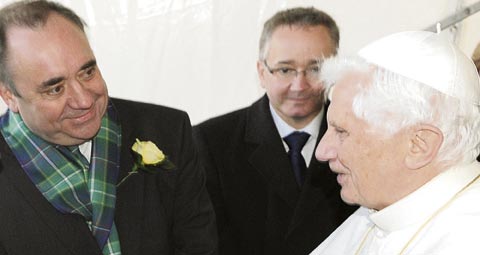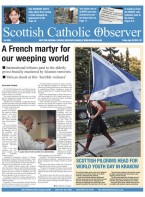July 1 | ![]() 3 COMMENTS
3 COMMENTS ![]() print
print

Charting the electoral winds of change
— Did the ‘Catholic vote’ play a decisive role in helping the SNP to attain a greater level of governance?
By David Kerr
Forty-three per cent. That’s how many of Scotland’s Catholics voted SNP in May—and that’s the first time the SNP have gained the largest share of Catholic votes in a national election. Labour, the traditional custodians of that title, scored only 36 per cent. So what on earth has changed? Well, okay, let’s get the clunkingly obvious caveats out the way from the kick-off.
The electoral research that figure is based on was published this month by Strathclyde University. It suggests that the SNP pretty much swept the boards with all sections of Scottish society. So it would seem unlikely that Catholics could somehow avoid being carried along by that electoral tsunami. And, yes, Catholics do have other identities—class, geography, gender—that also inform voting intention.
And yet, evidentially we also know that religion and religious identity does play a factor in that electoral calculation. We also know that even when the SNP has been riding high in the past it never quite beat Labour for a largest share of ‘the Catholic vote.’ In May, however, the SNP’s percentage of the Catholic electorate actually exceeded its exceptionally sizeable share of the overall national vote.
So allow me, if you will, to nominate three politicians—and only one of them a nationalist—who can perhaps help us to understand just why Catholics went SNP in May—Tony Blair, Jack McConnell and Alex Salmond.
It is arguable that Tony Blair never quite ‘got Scotland’ despite, ironically, being born and educated here. 1966 was his first year at Fettes College in Edinburgh. It was also the year in which the Labour Party won a formidable 49.9 per cent of the Scottish electorate in that year’s UK General Election.
But then the ‘Old’ Labour Party was a formidable brand—economically on the left, socially on the right, remarkably in tune with ‘middle-Scotland’ albeit not with ‘middle-England.’ Indeed, Labour was the national party of Scotland as well as a seemingly obvious home for many Catholics reared on diet of Rerum Novarum.
Tony Blair’s ‘New Labour’ project reversed all that—economically on the right, socially on the left, during a decade in office he repeatedly skittled the Catholic Church on a range of key ethical issues including life and family policy.
Indeed, his final year in power witnessed the sinister spectacle of Catholic adoption agencies being forcibly shut-down by the state for upholding the Church’s teaching on child welfare.
Not surprisingly, an increasing number of Scottish Catholics—especially those of a more practising, orthodox stripe who often shape opinion in parishes—started to slowly shuffle away from the party they once loved. Meanwhile Catholic politicians within the Labour Party were increasingly feeling their loyalties strained.
Then there’s Jack McConnell. Last year he became Baron McConnell of Glenscorrodale but he began his political career back in 1984 when, at just 24 years old, he won the Logie ward on Stirling District Council. That was in the days of one-councillor-per-seat and, more often than not, in urban Scotland that one councillor was a Labour councillor.
As a young SNP activist I vividly recall standing outside polling stations at various by-elections across the country. I’d hand out leaflets. The local Labour councillor didn’t need to. He knew most people and was on nodding terms with the rest. “Done your duty?” was the usual hail-fellow-well-met quip as voters exited the polling-station—they usually had.
In 2004, though, First Minister McConnell introduced a proportional voting system for local government. For Labour, all changed and changed utterly. The party went from controlling 15 councils to controlling just two. The power of local patronage was gone.
What’s more, now Labour councillors had to share their ward with members from other parties. Now the SNP had a presence—often a youthful, dynamic presence—in previous no-go areas for the party. And now the SNP could build bridges with local civil society including priests and parishioners, uprooting any lingering black myths of the SNP being in any way cool on Catholicism. The calumnious canard of ‘SNP—Scottish No Pope’ was finally, once and for all, killed stone-dead.
And so to politician number three—Alex Salmond. He’s the leader of a national movement that’s had Catholics integral to it from founding days. Indeed, the first elected nationalist—the writer Sir Compton Mackenzie—was a Catholic convert. And yet, on becoming national convener of the SNP in 1990, Alex Salmond made building even stronger bridges with the Catholic community a top priority.
He still speaks fondly of his friendship with the Cardinal Thomas Winning who ‘wanted people to understand that the Catholic Church was a valid part of Scottish society, equal in status to anybody else,’ the First Minister said. In fact, he judges his own record on the issue according to a biblical maxim given to him by the late cardinal: “Alex, by your deeds you shall be known.”
In that spirit, I last year witnessed at first-hand just how the First Minister committed himself to making a success of the Papal visit to Scotland at a time when many doubters were beginning to distance themselves from predicted national embarrassment. And on the morning of September 16 as 125,000 took to the streets of Edinburgh to welcome Pope Benedict, Alex Salmond was once again vindicated. The sun even shone.
So does he do these things because of perceived electoral advantage? Yes, of course. He’s a politician and a very good one at that. Over three decades he’s carefully crafted a coalition of all the communities that go to make up Scotland. And on May 6 it did seem that, finally, everybody was to be found in his big tartan tent.
But he’s also the real deal. Named after the local Kirk minister in Linlithgow, the Christian sympathies of this former boy chorister run deep even down to his penchant for quoting St Augustine and John Bunyan in private conversations.
I recall a meeting in 2009 before I agreed to stand for the SNP in the Glasgow North-East by-election. I expressed concern that if I ran some elements in the media would try to attack me on the basis of my Catholic orthodoxy.
“David, the vast majority of people in Scotland think Christianity is a very good thing and they respect a man of faith,” he said. So I ran. I got attacked. I lost. Alex Salmond, though, stood-by me throughout.
So will he be able to hold onto, or even build upon, this new found Catholic support and convert into a majority support for independence as well? Well, on the eve of last year’s Papal visit the First Minister observed that ‘without the Church, there would have been no Scotland as a country in its own right.’
As with medieval Scotland—so now with modern Scotland too. Catholics seem set to play a decisive role in whether or not our national sovereignty will be restored.
David Kerr is the Rome correspondent for a US-based news agency. He’s also a former SNP parliamentary candidate












you stood for scotland in a place most others would’ve thought: “what’s the point?”… fair play to you for being there.
anti scots sentiment still lives among scotland’s catholic community but aided with reason and truth i think it’s easier to overcome than in places of other faiths.
Fine article David and an indication of a changing Scotland. The SNP are the party of Scottish unity and all sections of society are now recognising this.
No more divide and rule.
Write more, thats all I have to say. Literally, it seems as though you relied on the video to make your point. You obviously know what youre talking about, why waste your intelligence on just posting videos to your blog when you could be giving us something informative to read?